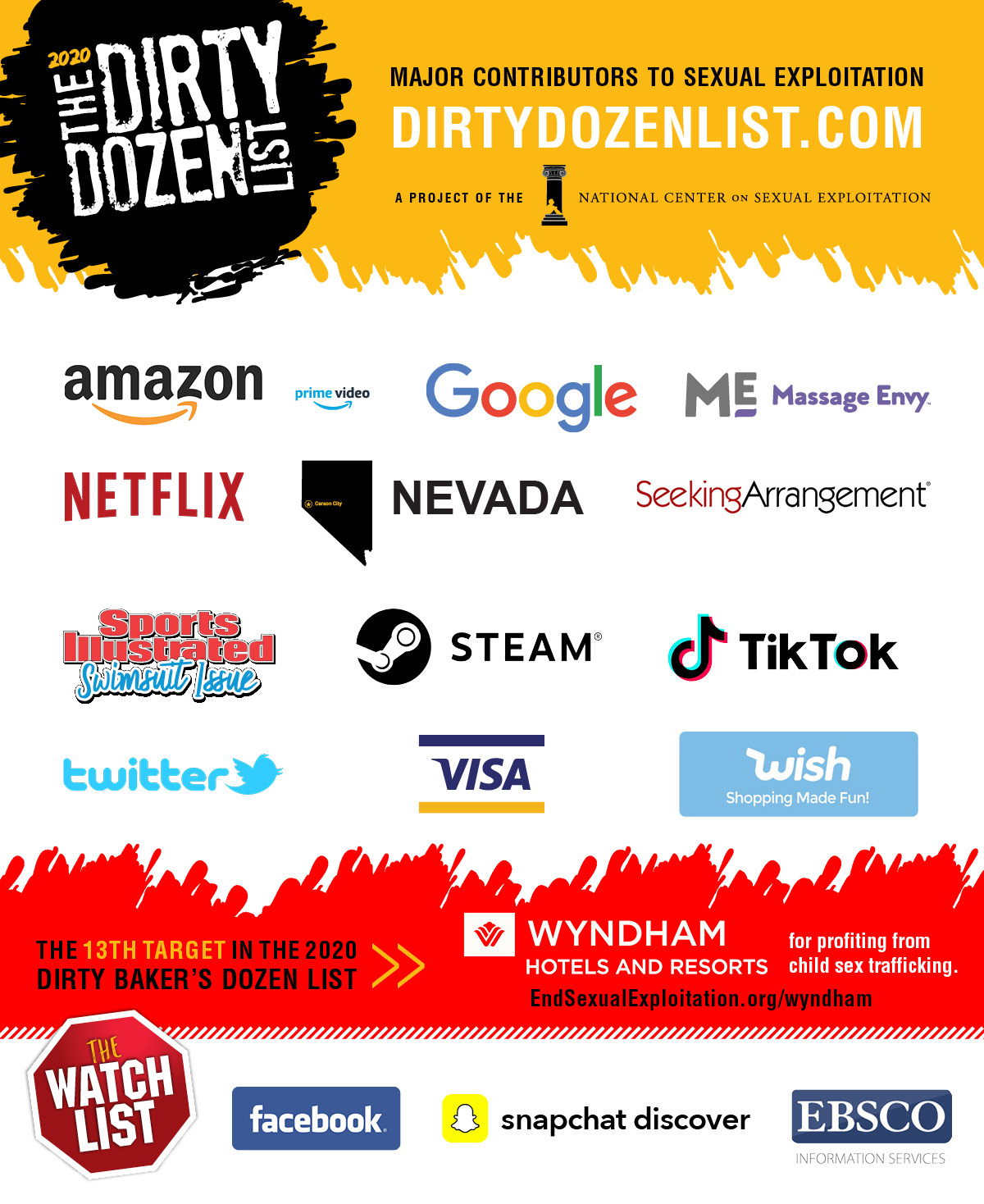
WASHINGTON (BP) — Emma, a 21-year-old college student, thought she could fly to meet a man on the other side of the U.S., have dinner and nothing more and simply return home.
Her date, an older affluent man who met her on the “sugar dating” website Seeking Arrangement and paid for her travel, instead tried to sexually assault her. The National Center on Sexual Exploitation (NCOSE) told Emma’s story in releasing its 2020 Dirty Dozen list of mainstream companies that facilitate, profit from or normalize sexual exploitation.
 “[Emma] was left alone and vulnerable across the country,” Haley McNamara, NCOSE vice president of advocacy and outreach, said at a 10 a.m. press conference in Washington. “There are many others who share her story and much worse.” Emma is one of 3 million college students who have free accounts on the website that misleads participants into thinking it’s not a prostitution site, McNamara said.
“[Emma] was left alone and vulnerable across the country,” Haley McNamara, NCOSE vice president of advocacy and outreach, said at a 10 a.m. press conference in Washington. “There are many others who share her story and much worse.” Emma is one of 3 million college students who have free accounts on the website that misleads participants into thinking it’s not a prostitution site, McNamara said.
“What we’re seeing here is the capitalization and sexual exploitation of an entire generation’s economic vulnerability, as the student debt crisis climbs to the trillions of dollars,” McNamara said of Seeking Arrangement. “No student should have to sexually barter for their education. Further, make no mistake. Sugar dating is pseudo dating — prostitution, and it’s vital to push back against this exploitive trend.”
The sugar dating site joins 12 others on the Dirty Dozen list that is for the first time a baker’s dozen. NCOSE credits Wyndham Hotels and Resorts with the 13th spot. The NCOSE Law Center is suing Wyndham on behalf of an alleged survivor of child sex trafficking on claims the company facilitated and profited from the sex trafficking of a minor at hotels Wyndham owns.
“In 2020, it is intolerable for a mainstream company or entity to facilitate, profit from, or normalize sexual exploitation” McNamara said. “And that’s why the Dirty Dozen List exists. This list ensures that their promotion and collusion with sexual assault, sex trafficking, pornography, the eroticization of incest, and more, becomes public knowledge, and equips concerned citizens with information and tools to hold them accountable.”
Seeking Arrangement and Wyndham are on the list for the first time, as are Visa, the discount shopping site Wish, and the TikTok social media video app. Returning in 2020 from the previous year are Amazon, Google, Massage Envy, Netflix, the state of Nevada, the Sports Illustrated Swimsuit Issue, Steam and Twitter.
Seeking Arrangement, with 20 million members and one of the largest sugar dating sites, makes a priority of targeting college students who struggle with debt, setting them up to “service socio-economically advantaged older men,” NCOSE said on its list. The system of “thinly veiled prostitution” could easily lead to sex trafficking, NCOSE said, citing an analysis from the Department of Homeland Security.
The NCOSE law center has an active lawsuit against Wyndham and its subsidiaries, accusing the companies of ignoring numerous signs that a girl was being sex trafficked at Super 8, Clarion Inn and Motel 6 locations for two years beginning when she was 16. Wyndham also profits from on-demand pornography offered in its rooms, NCOSE said.
Visa “partners with the pornography industry by processing payments for pornography with themes of sexual violence, racism, incest” and other themes, NCOSE said on its list. By contrast, other payment systems such as PayPal refuse to process payments to pornography websites, NCOSE said.
Wish, with 500 million users on its website and app, sells among its many products child-like sex dolls, spy cameras marketed for secretly filming nude women, and “misogynistic apparel featuring female nudity,” NCOSE said, “that minimizes women as two-dimension sex objects.”
With insufficient parental controls, TikTok serves as a “hunting ground for predators” and abusers who are able to contact children and request sexually explicit videos, NCOSE said of the site with 500 million active users worldwide.
NCOSE called out Amazon for peddling porn, sex dolls, photos of eroticized child nudity and other items; cited Google for a lengthy list of ills including unfiltered Chromebooks that expose children to hardcore porn; and said Massage Envy has made no efforts to correct a system that has led to more than 400 lawsuits of patrons being sexually harassed or assaulted during massages.
Netflix, which rates itself as suitable for children as young as 4, “often produces media portraying gratuitous nudity, graphic sexual acts, and even graphic depictions of sexual assault,” NCOSE said.
Nevada is the only state that has legalized brothel prostitution, which NCOSE said facilitates “the largest illegal commercial sex market in the country due to the increased demand for buying sex in this normalized atmosphere, abandoning many to be exploited in both prostitution and sex trafficking.”
The Sports Illustrated Swimsuit Issue has “sexually objectified women for sport and profit” since 1964, NCOSE said, and “any retailer that displays and sells it is condoning the toxic culture of entitlement to the female body.”
NCOSE called out the gaming platform Steam, with more than 35 million minors among its 90 million active users, for games promoting sex, violence and harassment.
Twitter, NCOSE said, is used incessantly to advertise prostitution and sex trafficking. NCOSE cited media reports suggesting “that as many as 10 million Twitter accounts may include explicit sexual content, and meanwhile Twitter’s policies place virtually no limits on the perpetuation and amassing of this content.”
Among its successes, NCOSE cites its advocacy for Google Play’s decision to no longer offer pornographic and sexually explicit apps, the training of more than two million military service members in anti-sex trafficking methods, and the ability of Comcast users to block pornographic content through improved parental controls.
















